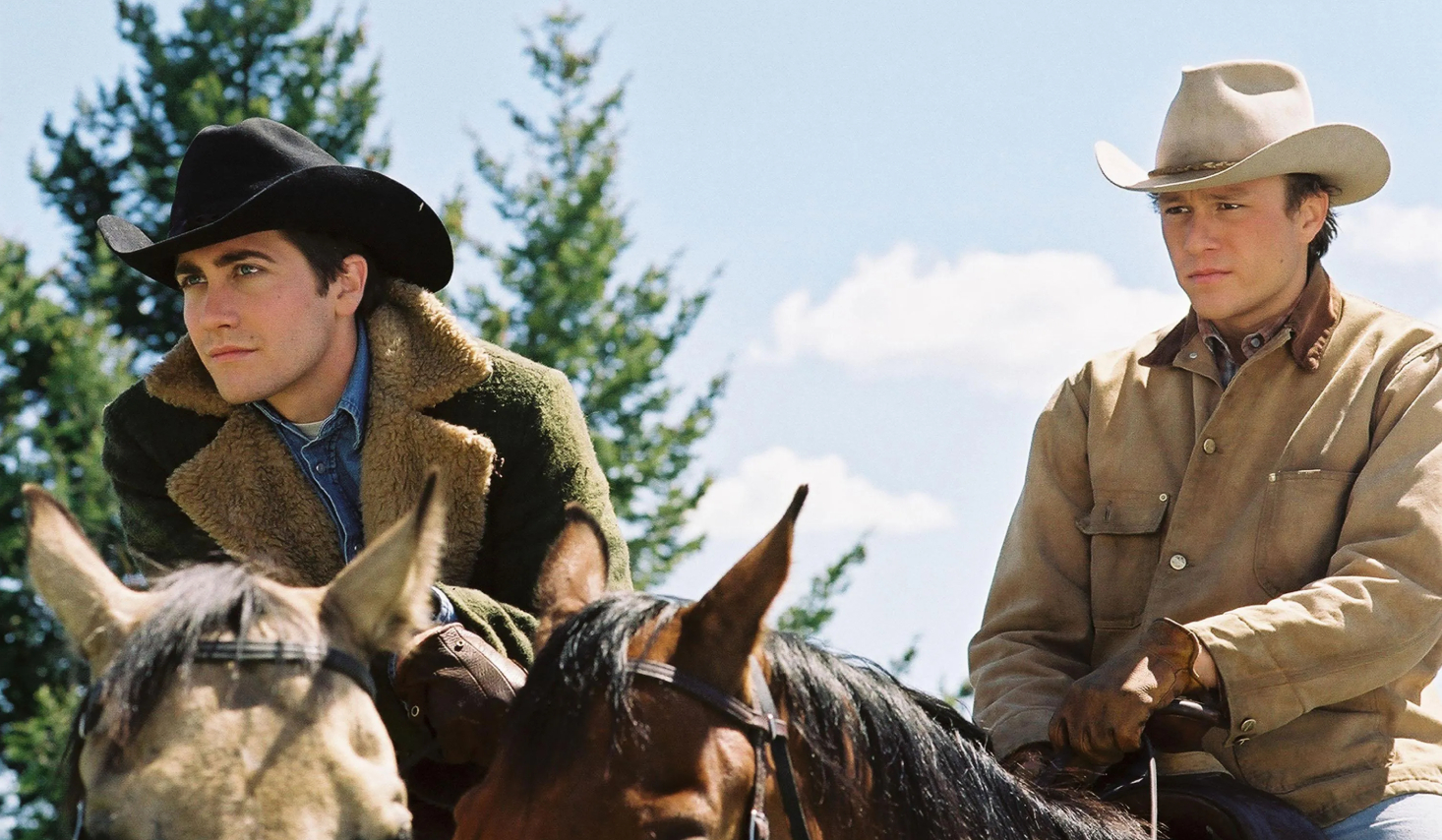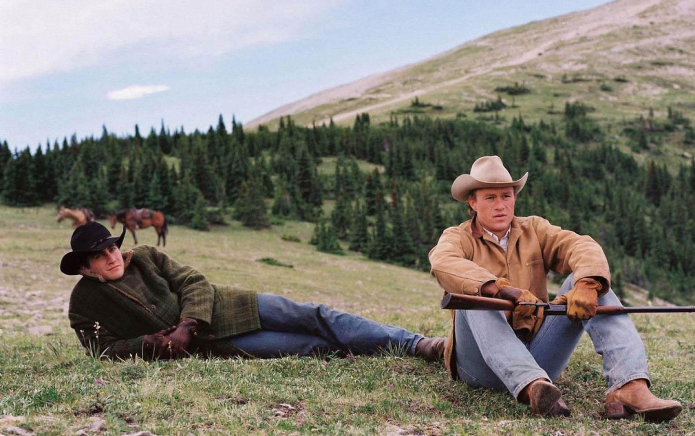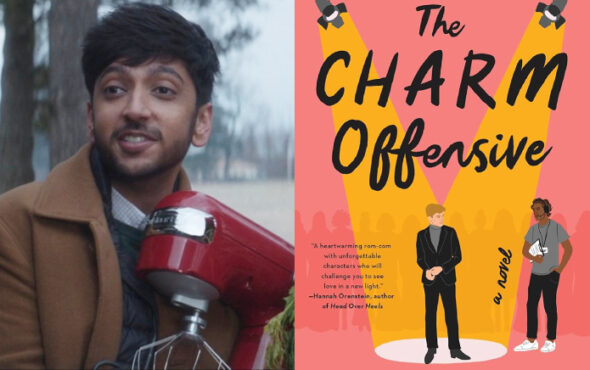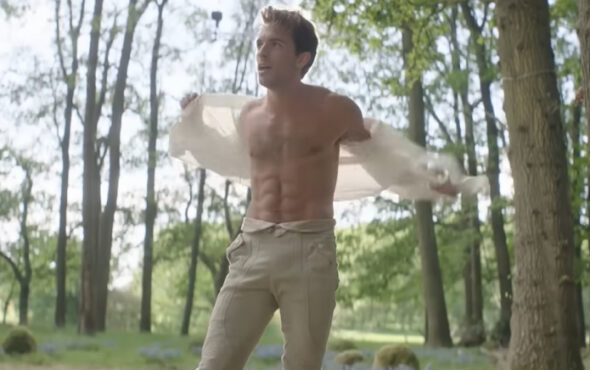
When Brokeback Mountain hit the silver screen back in December 2005, it was quickly labelled as a ‘gay cowboy film’ (derogatory). There was also scepticism that the film, which tells the love story between Ennis Del Mar and Jack Twist, respectively played by the late Heath Ledger and Jake Gyllenhaal – both of whom are straight – would shape up to be nothing more than a parody.
Brokeback Mountain is set in Wyoming, in post-war America in the 1960s, a time when LGBTQIA+ rights were non-existent to the point of being illegal in many states. However, this time period echoes the themes of the film in many ways.
The American 60s is defined by free love and conscientious objection, but it was also the beginning of social change and collective action for LGBTQIA+ people. Attitudes surrounding homosexuality were archaic, cruel and suffocating, a theme that runs through Brokeback Mountain – but so do the shifts in attitudes, even if they are internal realisations and not attached to broader cultural awakenings.
At the time, there were questions surrounding the suitability of the pair to portray this story. Additionally, concerns were raised about the commodification of queer pain and the doomed tragedy of gay love, especially as the film’s cresciendo involves an arguably unnecessary death and stumbles head first into the ‘bury your gays’ trope.
These criticisms are deserving and enduring, but given when the film was released and the positive impact it had, and still has, on many people who had not seen their story told before, it can’t be denied that Brokeback Mountain did something special.
The film encapsulated the complexities of compulsory heterosexuality, masculinity, identity and societal expectations with nuance and sensitivity. So much so, that it has had an enduring legacy as a queer classic, even 20 years on.
Here are some of the reasons why it has remained so beloved.
The integrity of the actors

While Gyllenhaal and Ledger were open to criticism about their straight identity, they both unashamedly and unabashedly put down any and all homophobic jokes or snide remarks that were made to shame or discredit the production, or the actors themselves.
During a press conference in 2006, Heath boldly defended the film — and queer love – when asked what he would say to those who found the romance “disgusting”.
He didn’t hesitate: “The movie is not a story about an epidemic or a virus, or something that can be cured in a hospital. We’re showing that love between two men is just as infectious and emotional, and strong and pure as it is with heterosexual love.”
The actor, who tragically passed away in 2008, added: “If you can’t understand that, don’t see the movie. It’s okay, we don’t care.”
@gaytimes Thank you, Heath Ledger! This year, Brokeback Mountain returns to cinemas for it’s 20th anniversary, so we’re taking a look back at the moment Heath Ledger proved his ally status during a press conference at the 2006 Berlinale Film Festival 👏 #heathledger #brokebackmountain #ally #10thingsihateaboutyou #thedarkknight #joker #allyship ♬ original sound – GAY TIMES
In 2019, Gyllenhaal appeared on Sunday Today to discuss the impact Brokeback Mountain had on his career. Remembering Heath fondly, he said, “I see people who have joked with me or criticised me about lines I say in that movie – and that’s the thing I loved about Heath.
“He would never joke. Someone wanted to make a joke about the story or whatever, he was like, ‘No, this is about love.’ Like, that’s it, man. Like, ‘no.'”
Symbolism of the landscape and subtext of the environment
Not only is the script full of heartfelt moments (“I wish I could quit you,” anyone?), but the environment is steeped in symbolism that perfectly captures the isolation both characters feel in themselves, but the propensity for freedom and the fear of that open space potential.
When they are out there, they are free to explore their emotions without imminent social shame, something they would certainly face if seen and spotted.

Even at the end of the film, where we see the shirts hung together, we’re reminded of the enduring love held by Ledger’s character for Gyllenhaal’s Twist. It shows us that he is tormented by the grief beneath his stoicism.
Scenes like this, that allow us to empathise with the tucked-away pain the characters build their life around, show us that they suffer a constant ache.
For its time, and for a mainstream Hollywood film to tackle these themes with sensitivity, had a profound impact on fans.
Humanising the lives of gay men
While 2005 had moved on somewhat from the intense homophobia of the 60s, things in America, and here in the UK, were certainly not “good” for gay people.
In the UK, it took until 2005 for gay people to earn the right to Civil Partnership (not marriage), and up to 1999 for anti-discrimination laws to be brought into effect. The hangover from the stigma of the AIDS epidemic, the intense laddish culture that tore at anything remotely feminine and non-heterocentric, and the vacuum left behind by Section 28, created an era of hateful violence, bullying and torment for many gay people. Something that has not been healed, even today.
This is why the humanisation of these characters as two people in love was so monumental. It had a profound effect for many who watched it because, for the first time, we were seeing an attempt to capture what it meant to love another man in a society that would have locked you up for it. We got to see people empathise, sympathise and realise how cruel these social rules were (are), and what’s more, created an open door for them to change their mind.
Is it perfect? No. Do the criticisms ring truer today? I’d argue yes. But the impact on those who saw it at the time cannot be ignored.

In a recent interview with Vanity Fair, Gyllenhaal recalled one fan reaction that left him stunned at the film’s impact on audiences.
“Heath and I were at a Q&A at the Aero Theatre in Los Angeles,” he said. “I remember us going to dinner while the movie was screening, and we were just joking backstage. I remember us coming onstage in a humorous mood, because we were having fun with each other.
“We sat down, the lights came up, and a man stood up – the movie had been out for a week and a half – and said, ‘I just want to say, this is my eleventh time seeing this movie. I can’t stop watching it, and I just want to thank you all for making it.’
“I thought, ‘Eleven times in ten days?’ I remember that washing over us. The profound realisation of the profundity of this thing. It happens constantly, to this day.”


